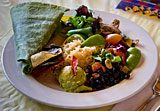Why Become Vegetarian?
Excerpted from Vegetarian Cooking for Starters by Diksha McCord
Perhaps once considered a strange lifestyle in Western culture, vegetarianism is now quite common in our society. Though each person’s decision to adopt a vegetarian diet is usually based on a combination of reasons uniquely his or hers, there are three primary concerns that vegetarians may have considered. These are improved health, ethical and environmental concerns, and spiritual convictions.
Improved health
As awareness of the role of saturated fats and cholesterol in obesity, heart disease, and cancer has grown, many Americans have adopted a vegetarian diet as a type of preventive medicine. Others say that there is more to be concerned about than just fat and cholesterol, that, in fact, human beings are simply not designed to property digest and thrive on meat. This view is based on the observation that the teeth and digestive tract in the human body are more like those of non-meat eating animals than that of carnivores.
Some question the safety of meat as a food, at least in the way that it is currently produced and marketed. Aside from the recent real problems of animal plagues that can infect humans also (such as “Mad Cow” Disease), there is a growing concern over the widespread use of antibiotics and hormones in the production of meat, and how human health may be affected by ingestion of drug-saturated meat.
Ethical and environmental concerns
It has been stated that if all the land currently used for animal grazing were put into grain, legume, and vegetable production, there would be no hunger and starvation in the world, as there would be ample supply to feed every man, woman and child a nutritious diet. Other concerns include: the rapid destruction of particular environments, such as the rainforest, in order to support the beef industry; mistreatment of factory-farmed animals; over-fishing of rivers and oceans, and the destruction of other species in the process (for example, dolphins that get caught in tuna fishing nets).
Spiritual convictions
A number of spiritual teachings, including those of yoga, Hinduism, Jainism, and many Native American and other aboriginal peoples, believe that all living beings are expressions of God. Therefore, all animals are equally precious embodiments of Spirit, and should be respected as such. The practice of killing animals for food is thus abhorrent to adherents of these religions and to be avoided except as necessary to sustain life (for example, in environments where there are few plant foods available).
What Do Vegetarians Eat?
As the name suggests, vegetarians do eat vegetables. But that is certainly not all we eat! I recall one particularly disappointing experience with what seems to be a common American concept of a vegetarian meal.
In 1994, while I was visiting friends in Los Angeles, we planned to have lunch at a highly regarded restaurant in one of the major downtown hotels. We made our reservations, specifically requesting a vegetarian entrée. I was really looking forward to the experience, because the restaurant had a reputation for exceptionally delicious food. To my dismay, our lunch consisted of ordinary pasta with red sauce, and plain boiled vegetables. Bland and unappetizing, it was essentially a meal from which the meat had been removed, but nothing at all interesting had been added!
A vegetarian diet can actually provide us with much more variety in tastes and textures than the typical meat-based fare. While the average American home-cooked meal generally consists of a piece of meat (or fish, perhaps), a starch (such as potatoes, rice, pasta or bread), and a cooked vegetable and / or salad, a vegetarian repast may be composed of a number of dishes combining legumes, grains, vegetables, nuts, fruits and seasonings.
And, not all vegetarians eat alike. Because of varying concerns about the quality and means of obtaining non-flesh animal products, there are differences in diet within vegetarianism. The three main approaches are:
Ovo-lacto vegetarianism, which includes the products of animals obtainable without slaughter, such as milk products, eggs, and honey.
Lacto-vegetarianism, which includes dairy products and honey but avoids eggs (as the embryos of potentially living beings).
Veganism, which avoids all products of animal origin, including honey and other bee products (usually based on a desire to avoid consumption of any food that involves the exploitation of animals).
In general, a balanced vegetarian diet is based on natural foods, including whole grains, legumes, vegetables, fruits, nuts, and seeds.
Free Videos and Articles
Come a Day Early
Relax, Take a Walk,
Get a Massage

Stay an Extra Day,
Relax,
Absorb Your Experience

Three delicious and satisfying
vegetarian buffet meals are included
with the cost of your stay





















